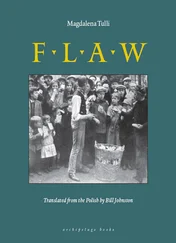SLOTZKI SINCERELY WISHED BANKRUPTCY ON FELEK WHEN THE latter took over the sewing shops that had continued to operate as before under the company of Loom & Son, yet which were less and less profitable now that the lucrative war contracts had come to an end.
“You’re going to trip up with those sewing shops,” he would mutter over cards as he threw his aces on the table and gathered the pot.
But Felek’s faith was unshakeable.
“The right card will always turn up eventually,” he would say when he lost for too long. And he would double the ante. The right card always did turn up, sooner or later.
The shelves of the sewing shop warehouses were piled to the ceiling with reels of musty thread for which the war had finished too soon. Before the thread could be used, the troops had been demobilized. The commissariat left the job of buying underwear to the soldiers’ wives. And the wives, fussier than the commissariat, would turn the garment inside out and check the seams before taking out their purses. New times required new threads. Felek incurred additional costs, which he docked from the seamstresses’ wages. He refused to budge on this matter.
“They don’t snap in the machines,” he would say. “It’s for your own convenience, and it’s more profitable. I’m not going to pay for it out of my own pocket.”
Once again the pedals of the sewing machines rattled fretfully, belts whizzed round, needles danced like crazy. The seamstresses toiled over long johns for civilians, by lamps that were too dim, for money that was too pale and had an insufficiently distinct watermark, without complaining, since they had not complained before. The wedding bands that had been converted into cash left a mark on their ring fingers, and a gold-tinged memory. A hand without a wedding band grows light; their husbands would lightly buy a third-class ticket and vanish without a trace, while they would be left with debts for spareribs bought at Felek’s butcher shop and long since eaten, or for coal from his coal yard that at some unnoticed moment had gone up in smoke. The profits from the sewing shops crowned Felek Chmura’s achievement in the town. All the cash circulating from one store to another flowed, via an ingenious system of canals and locks reaching from the port to the train station, straight into his coffers.
AT THAT POINT CHMURA TOOK FROM A DRAWER THE LITTLE BOX containing the ring that before the war Stefania had refused to accept from Kazimierz Krasnowolski, demanding time to think.
“Has she not done enough thinking by now?” he asked as he fastened his wing collar at the mirror and reached for his vest, which Adaś was holding in readiness. Once in his new suit he went directly to Neumann’s to ask for her hand.
“There’s not a lot of choice,” Neumann said that evening to Stefania, who was sitting mending some gloves in stubborn silence. “Unless you marry one of those clowns who take out a loan by mortgaging their own property and live off that. Remember, child, I’m getting on, and the factory is ruined.”
“Kazimierz’s orderly!” Stefania retorted. “Think what you’re saying, papa.”
She fell sick with longing for Kazimierz Krasnowolski. She trudged after him through mists of fever, through miry, treacherous swamps of love, till he threw her one of his beautiful crazy glances over his shoulder. But what was this? He had the features of Felek Chmura. The priceless image, tossed into the endless stream of weekdays and Sundays, had at some unknown moment been effaced. Stefania bit her lip and tossed on her tear-stained pillows.
“Are they not alike as two peas?” she would whisper and then, overcome by another wave of fever, start shouting that she’d even prefer Slotzki’s scars. The doctor offered no hope of a speedy recovery. Yet one day she rose from her bed, with rings under her eyes, but calm, and ordered her bath to be prepared. In the afternoon she laid out the cards for solitaire. The sequences came together of their own accord, as if they’d been waiting for weeks merely for the hand that would introduce the right order in the pack. The next day Stefania accepted the engagement ring from Felek Chmura.
“I get a blinding headache at the mere sight of the man,” she complained to her doctor. “How will I be able to put up with him under the same roof?”
Medicine knew no remedy for such an ailment.
ON THE DAY OF THE WEDDING THE BRASS BAND PLAYED ON the market square; the residents of Factory Street, Salt Street, Coal Street, and Guards Street danced to their hearts’ content, while children prowled among the long tables gripping rock-hard gingerbreads you could break your teeth on. As evening approached, Ludwig Neumann’s home was lit up like a lighthouse, Felek Chmura’s people stood cheering under the windows as they drank the happy couple’s health with liquor from a barrel the bridegroom had had rolled out for them, and the Gypsy band was drowned out by the firemen’s trombones. As the wedding guests raised a toast to Felek Chmura in the Neumanns’ dining room, Stefania snuck away to her old bedroom. “What have I done!” she asked herself in despair, pressing her temples. In the meantime a suckling pig roasted whole, an apple in its snout and festooned with plump sausages, was brought to the table.
“Where’s the bride gotten to?” asked the doctor, looking around. But his gaze, distracted and hungry, fastened on the serving dishes. Besides, amid the hubbub of exclamations and the clatter of glassware no one could hear anyone else.
“I’m no longer worried about the future,” Ludwig Neumann was saying on the other side of the table, beaming with satisfaction. He helped himself to a mighty portion of roast, which the doctor forbade with gestures over the animated hum. Neumann laughed till his belly shook, and waved a starched napkin at the doctor. “My dear fellow, you should know that roast meat is only harmful on weekdays, never on a holiday.”
The merriment was beginning to subside by the time the fireworks burst upward toward the turbid vault of the sky. The trombones squeaked wetly and out of tune, the fiddle was tangled in idiotic cadenzas. On the market square dogs with mud-spattered tails jumped onto the table laid out for the common people and gobbled up the leftovers.
“Get down there!” the odd person cried, trying to reach for a stick, but late at night the body would no longer leap after the voice, and legs were heavy as stones.
Ludwig Neumann suffered a twisting of the bowels soon after the last guests had left.
“I’d have eaten my fill of sausage as well if I’d known. Now it’s too late, too late,” he moaned in convulsions before he gave up the ghost.
ON THE PRETEXT OF MOURNING, STEFANIA AVOIDED FELEK. She had the servants set a separate table for him, in the kitchen or wherever else, so long as it was out of her sight. Eventually they stopped laying a place for him at all: exhausted, he would forget to eat. Yet Stefania was still tormented mercilessly by an unbearable pain in the temples that lasted whole days and nights.
Felek Chmura toiled like an ox to get Neumann’s factory up and working again. The old machines for producing wax cylinders, unused since the time of Ludwig Neumann Senior, were taken out of storage and repaired. Advertisements for the Stitchings mechanical instrument factory soon appeared in the newspapers, where they were noticed by demobilized soldiers tearing paper to make roll-up cigarettes. Barrel organs began appearing in the courtyards of apartment buildings. On the front of their cases, smelling of fresh lacquer, was the inscription “Ludwig Neumann” in gold copperplate, above a decorative flourish. The handles were turned by war invalids in tattered army greatcoats — one lame, another blind in one eye. The unfamiliar sounds played havoc with the operatic arias that filled Stefania’s home all day long.
Читать дальше












